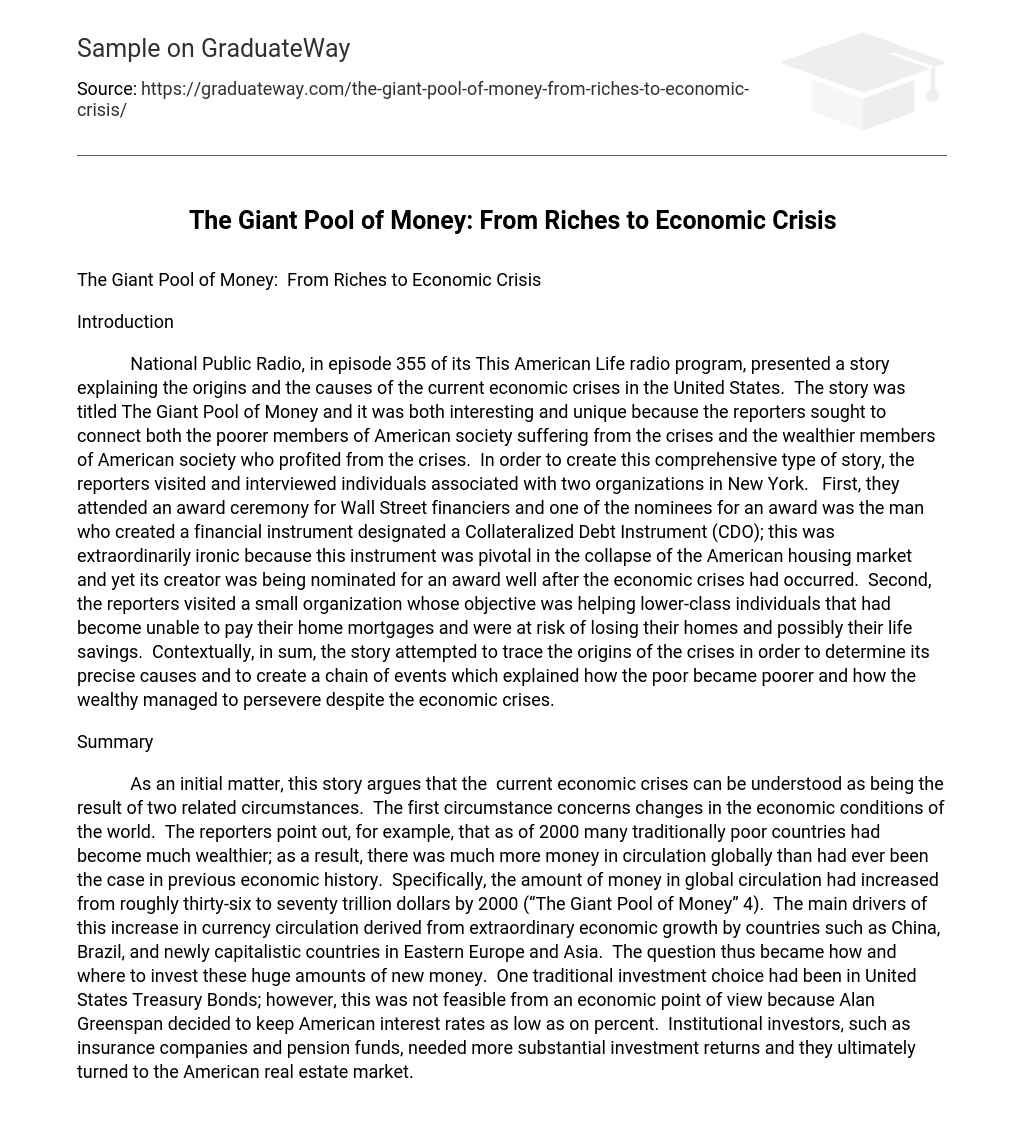Introduction
National Public Radio, in episode 355 of its This American Life radio program, presented a story explaining the origins and the causes of the current economic crises in the United States. The story was titled The Giant Pool of Money and it was both interesting and unique because the reporters sought to connect both the poorer members of American society suffering from the crises and the wealthier members of American society who profited from the crises. In order to create this comprehensive type of story, the reporters visited and interviewed individuals associated with two organizations in New York.
First, they attended an award ceremony for Wall Street financiers and one of the nominees for an award was the man who created a financial instrument designated a Collateralized Debt Instrument (CDO); this was extraordinarily ironic because this instrument was pivotal in the collapse of the American housing market and yet its creator was being nominated for an award well after the economic crises had occurred.
Second, the reporters visited a small organization whose objective was helping lower-class individuals that had become unable to pay their home mortgages and were at risk of losing their homes and possibly their life savings. Contextually, in sum, the story attempted to trace the origins of the crises in order to determine its precise causes and to create a chain of events which explained how the poor became poorer and how the wealthy managed to persevere despite the economic crises.
Summary
As an initial matter, this story argues that the current economic crises can be understood as being the result of two related circumstances. The first circumstance concerns changes in the economic conditions of the world. The reporters point out, for example, that as of 2000 many traditionally poor countries had become much wealthier; as a result, there was much more money in circulation globally than had ever been the case in previous economic history. Specifically, the amount of money in global circulation had increased from roughly thirty-six to seventy trillion dollars by 2000 (“The Giant Pool of Money” 4).
The main drivers of this increase in currency circulation derived from extraordinary economic growth by countries such as China, Brazil, and newly capitalistic countries in Eastern Europe and Asia. The question thus became how and where to invest these huge amounts of new money. One traditional investment choice had been in United States Treasury Bonds; however, this was not feasible from an economic point of view because Alan Greenspan decided to keep American interest rates as low as on percent. Institutional investors, such as insurance companies and pension funds, needed more substantial investment returns and they ultimately turned to the American real estate market.
This led to the second circumstance which caused the current economic crises. As these huge pools of money were being invested in American real estate it became necessary to create more loans. Thus, loans were given simply upon an application and without requiring minimum income standards or collateral. People began to apply for loans they could never repay and investors and banks began to pool these individual mortgages into huge obligations that were treated as securities.
This would lead to the creation of the creation of the Collateralized Debt Instruments and virtually all major institutional investors, both American and international, began investing heavily in these loans which had no reasonable guarantee of ever being repaid. Housing values skyrocketed, financial professionals made more money than ever before, and individuals and banks became indebted in ways that could never be repaid. In sum, the giant pool of money combined with Alan Greenspan’s refusal to raise interest rates persuaded investors to create unrealistic real estate securities in order to secure short-term profits.
Reflection
In reflection, it seems almost inconceivable that people could be so greedy and so foolish. Clearly, and without question, any rational human being must have realized that the loans being extended were extraordinarily risky and that there would be a high rate of default of foreclosure. This applies to both the wealthiest bankers and the poorest home buyers. It would therefore be unfair to blame only the rich or only the poor. Both can calculate simple math and these loans were pure speculation and destined to fail.
More blame should be assigned to Alan Greenspan and the Federal Reserve Bank. This is because these people were trained economists, they realized that maintaining low interest rates would steer investors of these huge pools of new money toward riskier investments, and even when the housing bubble appeared they refused to raise interest rates in order to steer money toward safer investments.
Even a sixth grader, without being sarcastic, realizes that an individual earning six dollars a month cannot afford a home mortgage of eight dollars a month; this is elementary addition and this is precisely how the economic crises originated. To be sure, hindsight is clearer than foresight; nonetheless, there is something very suspicious about Harvard and Stanford-trained economists not being able to predict that unverified loans on such a massive scale would not at some pint collapse like a house of cards. The current economic crisis is clearly the p[product of human fallibility and greed and the blame must be spread broadly because everyone suffering is to some extant to blame.
Works Cited
- “The Giant Pool of Money.” This American Life From WBEZ, National Public Radio (May, 9, 2008). Retrieved June 6, 2010 < http://www.thisamericanlife.org/radio-archives/episode/355/the-giant-pool-of-money?bypass=true>





